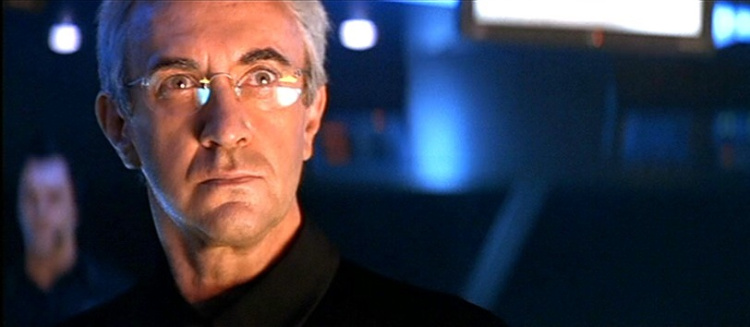20 Years On | How Tomorrow Never Dies Injected Fun Into the Brosnan Era of Bond
December 1997 saw the release of Tomorrow Never Dies, arguably the definitive Pierce Brosnan Bond film. It was the first film in the series to be released following the passing of Albert R. ‘Cubby’ Broccoli, who had spearheaded the franchise since its inception with Dr. No in 1962 and it had the always unenviable task of proving that Pierce Brosnan was no one-trick pony. While it’s not as iconic (nor as good) as GoldenEye, it’s a lot more fun and indicative of what the Brosnan era was overall.
Many will insist that GoldenEye was Pierce’s best, and while that may be true in a wider cinematic sense, that film (its iconic legacy perhaps unfairly enhanced by the Nintendo 64 game that every child of the 90s played) showcased a star who was nervous, unsure of himself and generally wet behind the ears. Tomorrow-Pierce is having as much fun as an actor can have with the Bond role. As the first actor young enough to have grown up with the franchise, he feels like he’s almost a surrogate for the audience themselves wishing THEY could be James Bond. While his quip-happy performance may lack the haunted humanity he showed flickers of in GoldenEye, his charisma nonetheless carries the film.
The cast is rounded up with the returning Judi Dench who has less to do than she did in the previous film (nearly all of her scenes take place in the same location, leaving one to wonder if she did them all in a day or two) is welcomed nonetheless. Teri Hatcher (never heard of her) plays the first-act sacrificial lamb, (a trope that has become an unfortunate mainstay of the Bond series). Her scenes are properly tragic and she makes for a genuinely interesting romantic interest for Bond (as opposed to a bedpost notch), making it a shame that the film dispatches her so quickly. The longer-lasting ‘Bond girl’ of the film is Michelle Yeoh’s Wai Lin who works really well as an ally (she did all of her own stunts) whose romantic involvement with Agent 007 in the closing moments of the film feels oddly forced.

The plot deals with a decoder-dohickey that has caused military planes to fly into regions they shouldn’t, causing political incidents that could lead to World War III. All of this is being manipulated by a news magnate, Elliott Carver (future High Sparrow Jonathan Pryce, with ham delicious enough for a Christmas dinner) who simply wants to have all the exclusive coverage of the stories. Some modern critics argue that Carver’s emphasis on traditional journalism date the film and that if the Internet existed to such an extent as it does twenty years later, his plan would be instantly foiled… not really sure those people have been following current events over the past two years.
One of the unsung highlights of Tomorrow Never Dies is the bombastic, larger than life 90s score by first-time Bond composer David Arnold (he would go on to compose the remaining Brosnan films and would return for two Craigs). Like Brosnan, Arnold is clearly a fanboy of the franchise and is particularly fond of the main James Bond theme tune. Whereas veteran composer John Barry grew tired of it (by the time of the later Roger Moore films, its inclusion in the films was perfunctory at best – a goofy, pedestrian arrangement would be thrown in for one action scene per movie and that was it) and GoldenEye composer Eric Serra dismissed it almost entirely, Arnold practically painted the film with traditional Bond-horns (ahem). From the mundane to the epic, almost every scene Bond appears in features the theme tune in some way – while some feel its use excessive, it does wonders for the film’s over the top charm. The riotously fun scene in the Hamburg airport with Q (the late, great Desmond Llewellyn) owes so much to Arnold’s score. Arnold also wrote the song ‘Surrender’ (which was meant to be the title song of the film, before being swapped out at the last second for a wildly inferior Sheryl Crow song named after the film itself) and its theme is woven throughout the film brilliantly.
It’s curious that TND would opt to be such a traditional Bond film only two years after GoldenEye. Brosnan’s debut film, like so many post-classic Bond films feels like a deconstruction of Bond – it spends much of its early acts apologising for the antiquated tropes of the franchise, going as far as to have Dench’s Thatcherite M (who dresses like Blofeld) refer to him as a ‘misogynist dinosaur’. That film ends with Bond choosing revenge over duty and his character arc in the film hangs a certain degree of doubt over his future in the service. Casino Royale left Bond in a very similar place some eleven years later, but its final scene (one of the best in the entire series) suggests a return to form and tradition… it doesn’t promise what we eventually got in Quantum of Solace.
Perhaps the Daniel Craig era’s great folly then is that it doesn’t have a Tomorrow Never Dies. For while Tomorrow may not be one of the best installments of the series, it brings the fun and the silliness booming back at precisely the right time. It’s bigger and louder than GoldenEye and having reconstructed Bond, it’s content to ride the fumes for a victory lap. Some would call this creatively bankrupt but this in many ways is the key strength of the film. Rather than try and be “GoldenEye 2”, TND opted instead to be a really fun James Bond movie that reminded people why the franchise was such a great time at the cinema. It cemented Brosnan as the Bond of a generation and it ensured that there was a place for Agent 007 not only after the Cold War, but into the new millennium.

